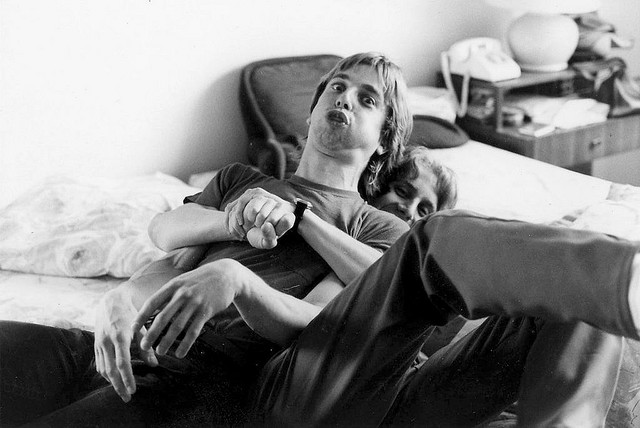
“Roughhousing is rowdy, which means that it pushes us out of our inhibitions and inflexibilities.” ~ from The Art of Roughhousing by Anthony T. DeBenedet and Lawrence J. Cohen
.
Sometimes folks wonder, “How can I play with my teenager?”
The best response is to play with your child as soon as they’re born and simply never stop. “Cats in the Cradle” is a painful reminder that we can’t re-do the past, and I have used the message in that song to motivate me to respond to my son’s requests with enthusiasm.
The other night my teen (The Boy) and I enjoyed catching up over a delicious meal together. As we finished, he told me, “I’m so full! I can’t eat another bite.” When the table was cleared, he sat there doing homework while I washed our dishes. It seemed like a calm and ordinary evening.
Minutes later, after sorting laundry in my bedroom—I walked around the corner in search of coins for the washing machine, and I came face to face with The Boy, as he was looking into the refrigerator. In a split second I realized this was an opportunity for play, and I sarcastically said, “You couldn’t possibly be looking for food right now, because you are so ‘full’ and ‘couldn’t eat another bite.’” I said this with a twinkle in my eye and air quotes on my fingertips.
The twinkle spread over him as well. He squinted at me, “Oh, you shut up!” Then he strong-armed me back around the corner towards my bedroom, and I knew—he was going to throw me on the bed and try to pin me down. I made a quick decision to start the game differently than usual, and I fired my muscles to throw him on the bed instead. This was not an easy effort—The Boy is 6’5” and 18 years old.
However, my attempt was successful—which made him laugh—and I let out a triumphant, “Ha!” But my victory was short lived, because within moments I was on the bottom with a pillow over my head and I couldn’t free my hands. Despite having difficulty breathing, I was absolutely delighted about what was happening. It had been months since we last wrestled like this!
Roughhousing on the bed had been a nearly daily activity, from shortly after The Boy learned to walk, until his early teens. But in the last couple of years it had tapered off—we hardly did it anymore.
I realized immediately that The Boy had grown stronger since our last wrestling session, because I had serious problems getting the upper hand. He seemed to lean on me casually, while I grunted and pushed with all my weight, but still couldn’t get him to budge. He looked pleased with his prowess. I made a big show of the struggle I was having, but unlike a few years ago—when a lot of the show truly was just for show—this time my struggle was 100% real.
I could not get that kid off me!
We wrestled for about 15 wonderful minutes. We could enjoy this spontaneous playtime because of the hundreds of hours we had put into roughhousing over the years. I would have been terrified to have The now-huge Boy throw me on the bed and pin me down with a pillow over my head without all the previous practice. Getting to experience some serious fun together in the middle of a regular evening was the pay-off from all those hours I spent throwing The little Boy around the bed and letting him jump on me.
Roughhousing with thoughtful attention is one of my favorite parenting practices. It’s the best way I know to get closeness and laughter at the same time. The physicality of it gets your whole being involved, and the taste of risk brings you immediately into the present moment. Your mind has to be quick, and you need to stay aware as you play with your partner. I am hard-pressed to think of other ways to show my son that I am totally attuned to him and interested in him.
As he was growing up, roughhousing allowed The Boy a safe place to be aggressive—to work out some of his feelings and to turn the tables on the adult-ism he ran into every day, that tries to keep young people in a more powerless position in our society. It’s a very common way for mammals of all kinds to learn the boundaries of their strength and the boundaries of others while joyfully being quite intimate.
Roughhousing has been a bonding experience, and it has been healing for our relationship—I look forward to the next time.
.
Relephant:
Parenting Lessons I Learned From a Waldorf Kindergarten.
3 Tips for Raising an Intact Child.
.
Author: Kerri Wall
Editor: Yoli Ramazzina
Photo: Flickr/John Althouse Cohen








Read 2 comments and reply